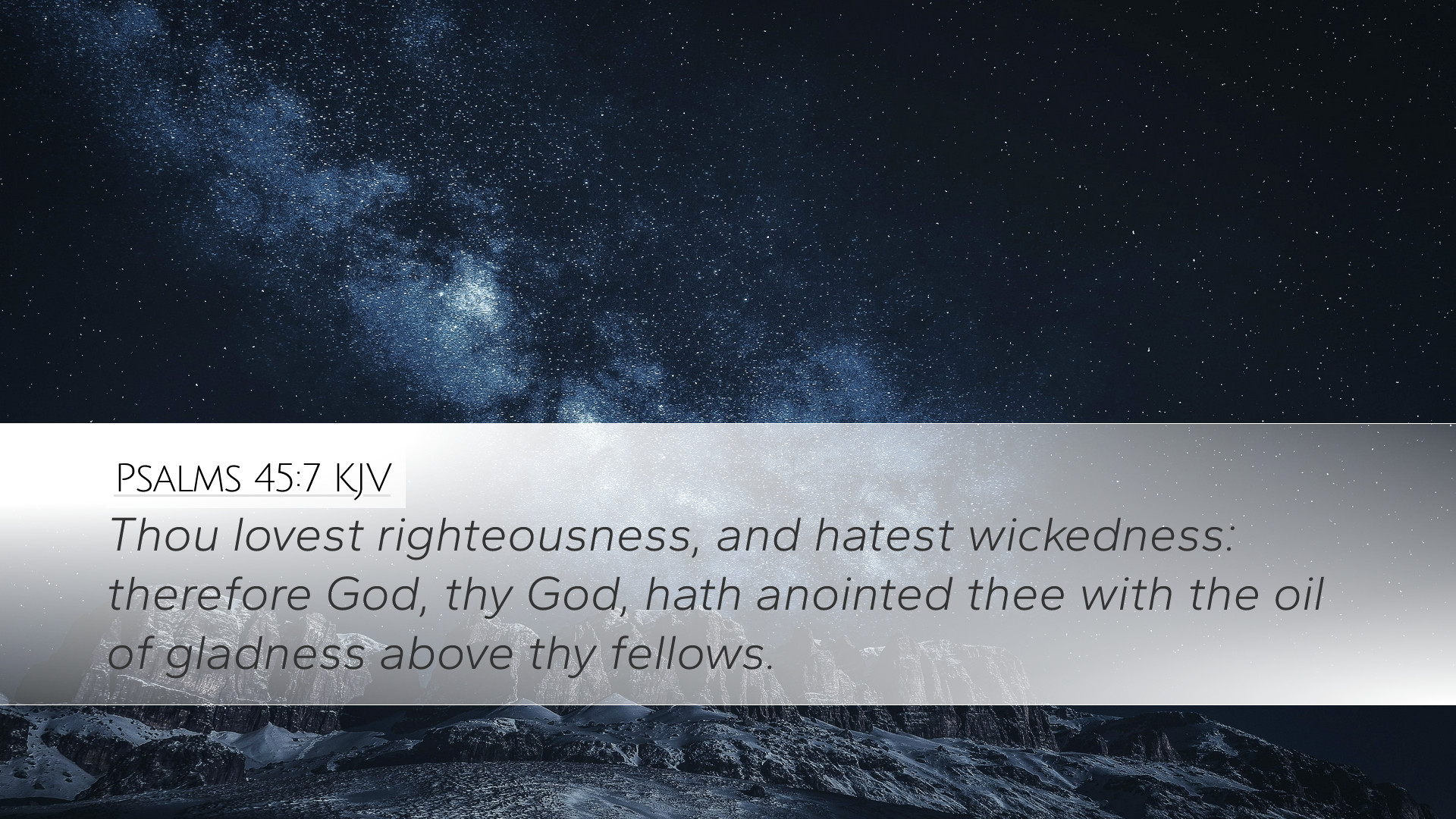Psalms 45:7 Commentary
Bible Verse: "Thou lovest righteousness, and hatest wickedness: therefore God, thy God, hath anointed thee with the oil of gladness above thy fellows." (Psalm 45:7)
Introduction
The verse found in Psalm 45:7 speaks of divine approval and anointing due to the love of righteousness and the disdain for wickedness. This passage is rich with theological significance and serves as a profound insight into the nature of God's relationship with His chosen leaders—particularly in the context of messianic prophecy. Notably, notable commentators such as Matthew Henry, Albert Barnes, and Adam Clarke provide insights that can deepen our understanding.
Theological Significance
This verse highlights two essential attributes of God's character as they relate to His people:
- Love of Righteousness: The pursuit of and delight in righteousness reflects God's nature, which believers are called to emulate.
- Hatred of Wickedness: The clear distinction between good and evil underlines the moral integrity that God desires in His chosen ones.
Thus, the verse is not simply descriptive; it establishes a principle that those who govern or lead—spiritually or otherwise—must cultivate a love for righteousness and an abhorrence of wickedness.
Commentary Insights
Matthew Henry's Perspective
Matthew Henry emphasizes that this verse is part of a messianic psalm. He interprets the anointing referred to here as the setting apart of Christ, who embodies perfect righteousness. Henry explains that the "oil of gladness" symbolizes joy and the spiritual blessing that comes from God. The anointing reflects a moral and regal authority, signifying that Christ's kingship is derived from His character, which is aligned with righteousness. The joys of His reign stem from His righteous governance.
Albert Barnes' Analysis
Albert Barnes elaborates on the phrase "lovest righteousness." He posits that this phrase acknowledges God’s disposition towards moral goodness. Barnes notes that this love is not passive; it is an active force that drives both God and His chosen leaders to engage against injustice and sin. Furthermore, he highlights that this anointing with "the oil of gladness" indicates an exaltation above others, drawing attention to Christ's superiority not only in position but also in moral excellence. This joy and gladness arise from fulfilling God's will and living in accordance with divine principles.
Adam Clarke's Interpretation
Adam Clarke provides a nuanced reading of the verse, noting that the hate for wickedness must correspond with action against it. He observes that true leadership recognized by God is characterized by this duality of loving righteousness and hating wickedness. According to Clarke, the anointing is a divine endorsement of those who embody these virtues, leading to a refreshing experience symbolized by "oil of gladness.” Additionally, Clarke remarks on the communal aspect of this anointing, where the anointed one spreads joy and delves into the doctrine of the Holy Spirit as the source of this gladness.
Practical Application
For pastors, students, theologians, and Bible scholars, Psalm 45:7 serves as a reflective text on the qualities essential for leadership within the church and society:
- Embrace Righteousness: Leaders and believers alike are called to actively pursue righteousness in their personal lives and communities.
- Reject Wickedness: There must be a clear stance against unethical practices, sin, and injustice, recognizing that God's favor rests upon those who uphold His standards.
- Seek Anointing: Pray for the Holy Spirit’s empowerment to live out these qualities, which provides joy and gladness in the journey of faith.
- Joy in Service: Recognize that true joy emerges from living a life that honors God through righteousness rather than merely seeking personal satisfaction.
Conclusion
Psalm 45:7 is a rich verse that reflects on the moral imperatives of righteousness and the disdain for wickedness. Insights from Matthew Henry, Albert Barnes, and Adam Clarke enhance our understanding of this psalm as not only pertinent to the anointed king, traditionally viewed as David and prophetically referring to Christ but also as a model for believers today. As we pursue a godly life, may we embody the principles found in this verse, leading ourselves and others towards a life filled with divine joy and righteousness.


